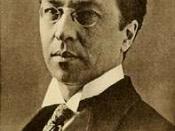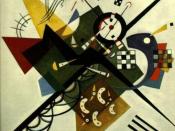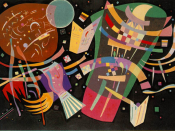Introduction This essay is about abstraction, Wassily Kandinsky and Mark Rothko. In the first subject I shall try to define the word abstraction and write about the paths to abstraction, I will then go on to introduce Wassily Kandinsky as the second subject. I will discuss Kandinsky's theories on abstraction and analyse Kandinsky's Improvisation No 30. The third subject is about Mark Rothko and his experimentation with colour, scale, balance, depth, shape and composition. I will then discuss Rothko's No14.
Defining Abstraction It is quite difficult, perhaps impossible to achieve a precise and definite definition of the word abstraction in regards to Art. Just as all art is primarily abstract, all abstract art is in a sense representational. Some abstract paintings intentionally refer to aspects of the familiar world. Others unintentionally suggest them. It is difficult to invent an image that doesn't remind the viewer of something. There are generally two ways of describing Abstract art Pure-Abstractions and Near-Abstractions.
A Pure-Abstraction is when the artist composes an artwork using abstract elements such as geometrical or amorphous shapes. Near-Abstractions are compositions in which the artist starts with natural forms and transforms them into abstract or nearly abstract forms.
Paths to Abstraction The impulse toward abstract art may be divided historically into two main currents, both which emerged from impressionism. The first is Cubism and finds its delta in the various geometrical and constructivist movements. This current may be described as intellectual, structural, architectonic, geometrical, rectilinear, and classical in its simplicity and dependence upon logic and calculation. The second is the art and theories of Gauguin and his circle; this flows through the "fauvism"� of Matisse to the abstract expressionism of the pre-war paintings of Kandinsky. In contrast to the first it is intuitional and emotional rather than intellectual; organic rather...


